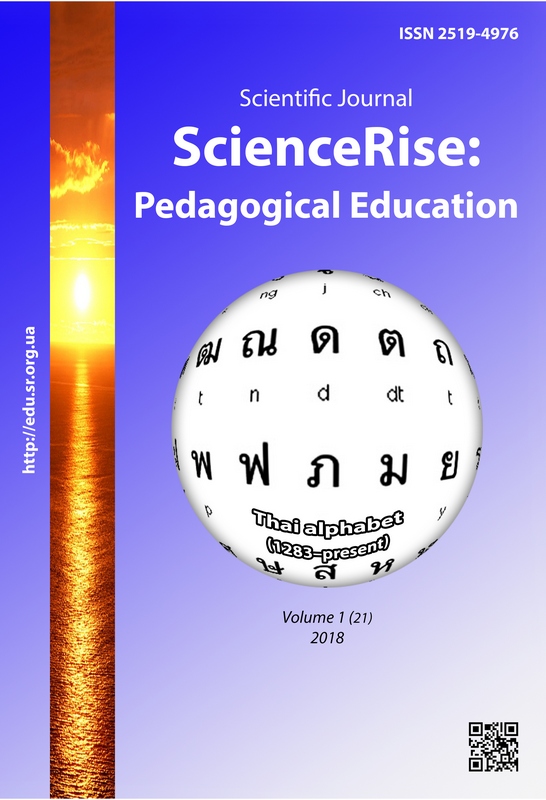Development of multimedia of teaching with pedagogical and psychological aspects
DOI:
https://doi.org/10.15587/2519-4984.2018.122225Keywords:
methodical-didactic complexes, information technologies, educational resources, telecommunication technologies, pedagogical technologiesAbstract
One of the greatest benefits of using modern technology is the ability to access useful information, including the world's largest educational database resources. Most of higher education institutions offer full online versions of their training courses. Nowadays, the Internet resources are enormously popular, especially for students. From the point of view of pedagogy and psychology, the knowledge that a student receives with multimedia-didactic materials assimilates twice as fast as in the traditional way. Higher educational institutions frequently use distance learning systems. It helps to make students interested in a certain discipline. The multimedia-didactic materials provide detailed information about the discipline using various forms and methods of drawing the students attention. Multimedia-didactic materials on discipline "Illustration" are educational environment, which contains the following elements: pedagogical, didactic and methodical materials, specific for the interaction of participants in the educational process; informational resources: libraries and e-learning materials and e-communication facilities
References
- Zhuk, E. Yu., Krasovskiy, V. I., Tonkonogov, B. A., Grigoreva, E. E., Kapustina, T. G. (2016). Proektirovanie distantsionnykh kursov v svete dopolnitel'nogo obrazovaniya spetsialistov. Ekologicheskiy Vestnik, 3 (37), 19–23.
- Averchenko, L. K. (2011) Distantsionnaya pedagogika v obuchenii vzroslykh. Filosofiya obrazovaniya, 6 (39), 322–329
- Bondar, V. I. (2002). Pedahohika y filosofiia: vzaiemodiia i vzaiemozbahachennia. Vyshcha osvita Ukrainy, 3, 14–19.
- Olnev, A. S. (2011). Ispolzovanie novykh tekhnologiy v distantsionnom obuchenii. Aktualnye problemy sovremennoy nauki, 1, 96–104.
- Anisimov, A. M. (2009). Rabota v sisteme distantsionnogo obucheniya Moodle. Kharkiv: KHNAGKH, 292.
- Talyzina, N. F. (2001). Pedagogical psychology. Moscow: Publishing Center "Academy", 185.
- Topunova, M. K. (2012). Otsenka kachestva znaniy uchashhikhsya pri distantsionnom obuchenii v sisteme nachal'nogo obshhego obrazovaniya. Distantsionnoe i virtual'noe obuchenie, 2, 31–42.
- Lavrentev, G. V., Lavrenteva, N. B., Neudakhina, N. A. (2002). Innovatsionnyye obuchayushchiye tekhnologii v professional'noy podgotovke spetsialistov (chast' 2) [Innovative teaching technologies in vocational training of specialists (part 2)]. Barnaul: Publishing house of Altai State University, 146.
- Simonenko, V. D., Retivykh, M. V. (Eds.) (2003). Obshchaya i professional'naya pedagogika. Kn.1 [General and professional pedagogy. Book 1]. Bryansk: Izdatelstvo Bryanskogo gosudarstvennogo universiteta, 174.
- Kravchenia, A. O. (2014). Pedahohichni prohramni zasoby v pidhotovtsi maibutnikh uchyteliv informatyky. Pryznachennia ta klasyfikatsiia. Obrii, 1 (38), 73–75.
Downloads
Published
How to Cite
Issue
Section
License
Copyright (c) 2018 Tetiana Andriuschenko, Svetlana Nazarova

This work is licensed under a Creative Commons Attribution 4.0 International License.
Our journal abides by the Creative Commons CC BY copyright rights and permissions for open access journals.
Authors, who are published in this journal, agree to the following conditions:
1. The authors reserve the right to authorship of the work and pass the first publication right of this work to the journal under the terms of a Creative Commons CC BY, which allows others to freely distribute the published research with the obligatory reference to the authors of the original work and the first publication of the work in this journal.
2. The authors have the right to conclude separate supplement agreements that relate to non-exclusive work distribution in the form in which it has been published by the journal (for example, to upload the work to the online storage of the journal or publish it as part of a monograph), provided that the reference to the first publication of the work in this journal is included.








